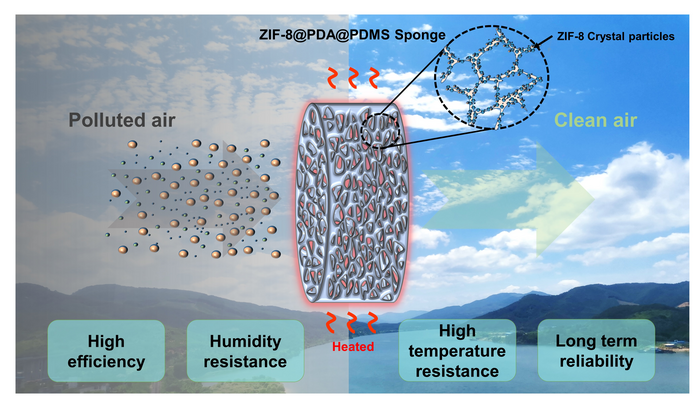A team of researchers has designed a high-performance composite sponge that works effectively to filter particulate matter in high temperature and high humidity environments. The sponge, with its excellent mechanical properties, is made of environmentally friendly materials. This filter has potential for helping to fight air pollution in automobiles and in industry.

Credit: Yukui Gou, Fuzhou University
A team of researchers has designed a high-performance composite sponge that works effectively to filter particulate matter in high temperature and high humidity environments. The sponge, with its excellent mechanical properties, is made of environmentally friendly materials. This filter has potential for helping to fight air pollution in automobiles and in industry.
The team of Chinese researchers from Fuzhou University published their work in the journal Particuology on October 3, 2022.
Particulate matter from automobile exhaust and industrial chimneys poses a significant danger to both humans and the environment. The problem of pollution from exhaust gas exists in countries around the world. Particulate pollution is especially dangerous for humans, impairing the central nervous system and the respiratory system. To solve the problem of air pollution and improve the quality of the environment, scientists have been working to build better air filters. But to this point, the air filters being developed have not performed well in harsh environments, where high temperatures, high humidity, or the need for long periods of filtration bring added challenges.
To build a better air filter, the research team designed a three-dimensional particle capture device. They used a simple sacrificial template method to create a polydimethylsiloxane (PDMS) sponge. Next, they applied a polydopamine (PDA) coating onto the sponge skeleton using an in-situ loading method. Then, a large number of ZIF-8 particles were grown on the PDA coating. ZIF-8 is a metal-organic framework, a class of porous materials that are versatile in their structural and chemical tunability. Metal-organic frameworks exhibit good potential for applications in the fields of gas adsorption and air filtration. The abundant pores in the composite sponge provide good air flow and the ZIF-8 particles enhance the sponge’s filtration performance.
The team tested their sponge under high temperature (250 degrees Celsius) and high humidity (90 percent relative humidity) conditions that simulated an industrial high temperature environment. The results at the high temperatures and humidity show the composite sponge’s strong potential for applications in industry.
The team further tested the composite sponge under the conditions required for use in filtering automobile exhaust. The sponge can be easily shaped and has structural stability, allowing it to be used in different scenarios, as needed. So the team prepared the composite sponge to fit at the exhaust pipe mouth. In the automobile exhaust tests, which simulated the exhaust emitted by automobiles during normal operation, the composite sponge achieved over 99 percent efficiency in removing particulate matter. Even after 65 hours of filtration, the composite sponge still achieved excellent performance.
“This study provides a new idea for designing 3D high-efficiency air filters that can adapt to harsh environments,” said Yuekun Lai, a professor at Fuzhou University. Because the composite sponge has good structural stability and can also be easily shaped, it is suitable for use in applications ranging from automobile exhaust to industrial chimneys to kitchen fans.
“In the next step, our research team will explore gas filters that can adapt to higher temperatures, as well as ways to treat certain components of air pollutants, not just particulate matter filtration,” said Lai. In this way, the researchers might expand the application scenarios of gas filters and also improve the potential for practical applications. “Our ultimate goal is to achieve a gas filter that can be used in a variety of environments, and a high-efficiency filter material with a variety of functions,” said Lai.
The research team includes Yukui Gou, Yuanye Hao, Weilong Cai, Jianying Huang, and Yuekun Lai from the College of Chemical Engineering, Fuzhou University. Cai, Huang, and Lai also work at the Qingyuan Innovation Laboratory.
The research is funded by the National Natural Science Foundation of China, Natural Science Funds for Distinguished Young Scholar of Fujian Province, and Natural Science Foundation of Fujian Province.
Particuology (IF=3.251) is an interdisciplinary journal that publishes frontier research articles and critical reviews on the discovery, formulation and engineering of particulate materials, processes and systems. Topics are broadly relevant to the production of materials, pharmaceuticals and food, the conversion of energy resources, and protection of the environment. For more information, please visit: https://www.journals.elsevier.com/particuology.
Journal
Particuology
DOI
10.1016/j.partic.2022.09.001
Method of Research
Experimental study
Article Title
Rational designed ZIF-8@PDA@PDMS composite sponge for efficient and sustainable particulate matter filtering under harsh environment
Article Publication Date
3-Oct-2022




